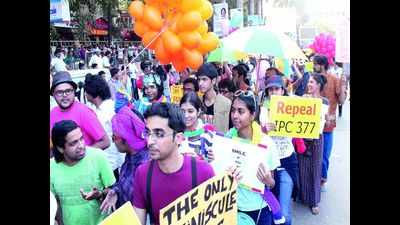- News
- City News
- bengaluru News
- A true win for the LGBTI community will be when the Delhi HC ruling on Sec 377 is reinstated
Trending
This story is from August 30, 2017
A true win for the LGBTI community will be when the Delhi HC ruling on Sec 377 is reinstated
The recent SC ruling on Right to Privacy as a fundamental right to include sexual orientation, among others, does not automatically strike down Sec 377, says gay rights activist, Ashok Row Kavi

The recent SC ruling on Right to Privacy as a fundamental right to include sexual orientation, among others, does not automatically strike down Sec 377, says gay rights activist, Ashok Row Kavi
Privacy includes at its core the preservation of personal intimacies, the sanctity of family life, marriage, procreation, the home and sexual orientation,” read one part of the recent nine-member bench Supreme Court (SC) ruling on the Right to Privacy. The last bit sent waves of jubilation among sections of the LGBTI community, which saw it as a ray of hope in its fight against Section 377.While some reportedly even went to the extent of saying that it is as good as restoring the Delhi HC order on Sec 377, gay rights activists Ashok Row Kavi warns against rejoicing too soon.
“The connection to the LGBTI movement is actually in the Delhi High Court. Justice AP Shah had given a detailed and progressive definition of privacy. If you observe here, the definition of privacy is constrained to what it means and not its impact. In this judgment, it touches upon privacy being a core fundamental right and that a person’s home is his castle, etc. This, to me, is a lot of hot air,” claims Ashok.
Considering that the Supreme Court had earlier overturned the Delhi High Court order striking down Sec 377, Ashok believes that what the nine-member bench should have said is that there is no further need for a bench to determine the constitutionality of this imperial law. “The Indian Penal Code (IPC) was charted by the British Colonial regime in 1869. Our Constitution came into being in 1952 and should have overwritten the IPC. There have been parts of the IPC that have been struck down, like the Criminal Tribes Act, then why not Sec 377? Why has this nine-member bench not overruled Justice Singhvi’s 2013 order that overturned the HC ruling?” asks Ashok.
“The connection to the LGBTI movement is actually in the Delhi High Court. Justice AP Shah had given a detailed and progressive definition of privacy. If you observe here, the definition of privacy is constrained to what it means and not its impact. In this judgment, it touches upon privacy being a core fundamental right and that a person’s home is his castle, etc. This, to me, is a lot of hot air,” claims Ashok.
Considering that the Supreme Court had earlier overturned the Delhi High Court order striking down Sec 377, Ashok believes that what the nine-member bench should have said is that there is no further need for a bench to determine the constitutionality of this imperial law. “The Indian Penal Code (IPC) was charted by the British Colonial regime in 1869. Our Constitution came into being in 1952 and should have overwritten the IPC. There have been parts of the IPC that have been struck down, like the Criminal Tribes Act, then why not Sec 377? Why has this nine-member bench not overruled Justice Singhvi’s 2013 order that overturned the HC ruling?” asks Ashok.
End of Article
FOLLOW US ON SOCIAL MEDIA










